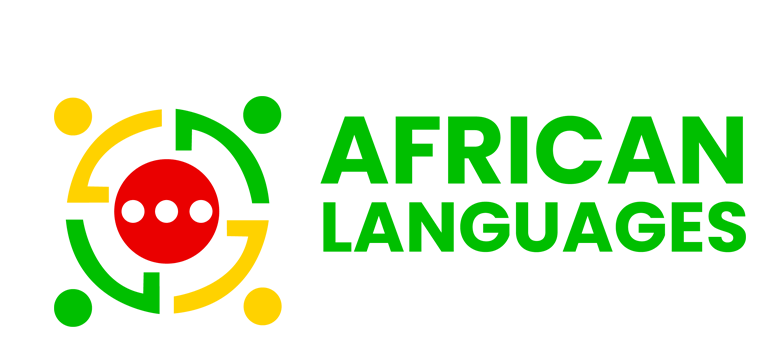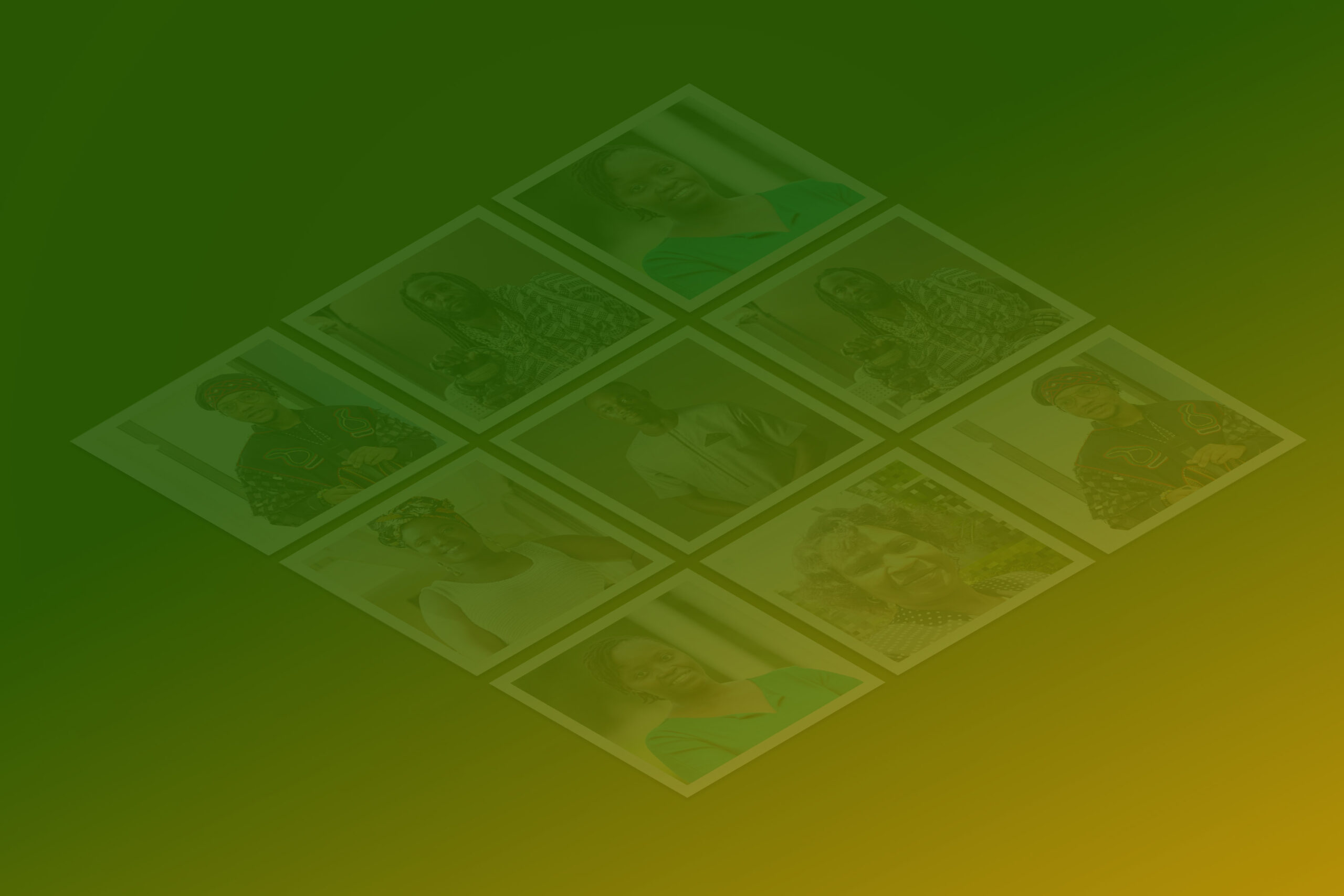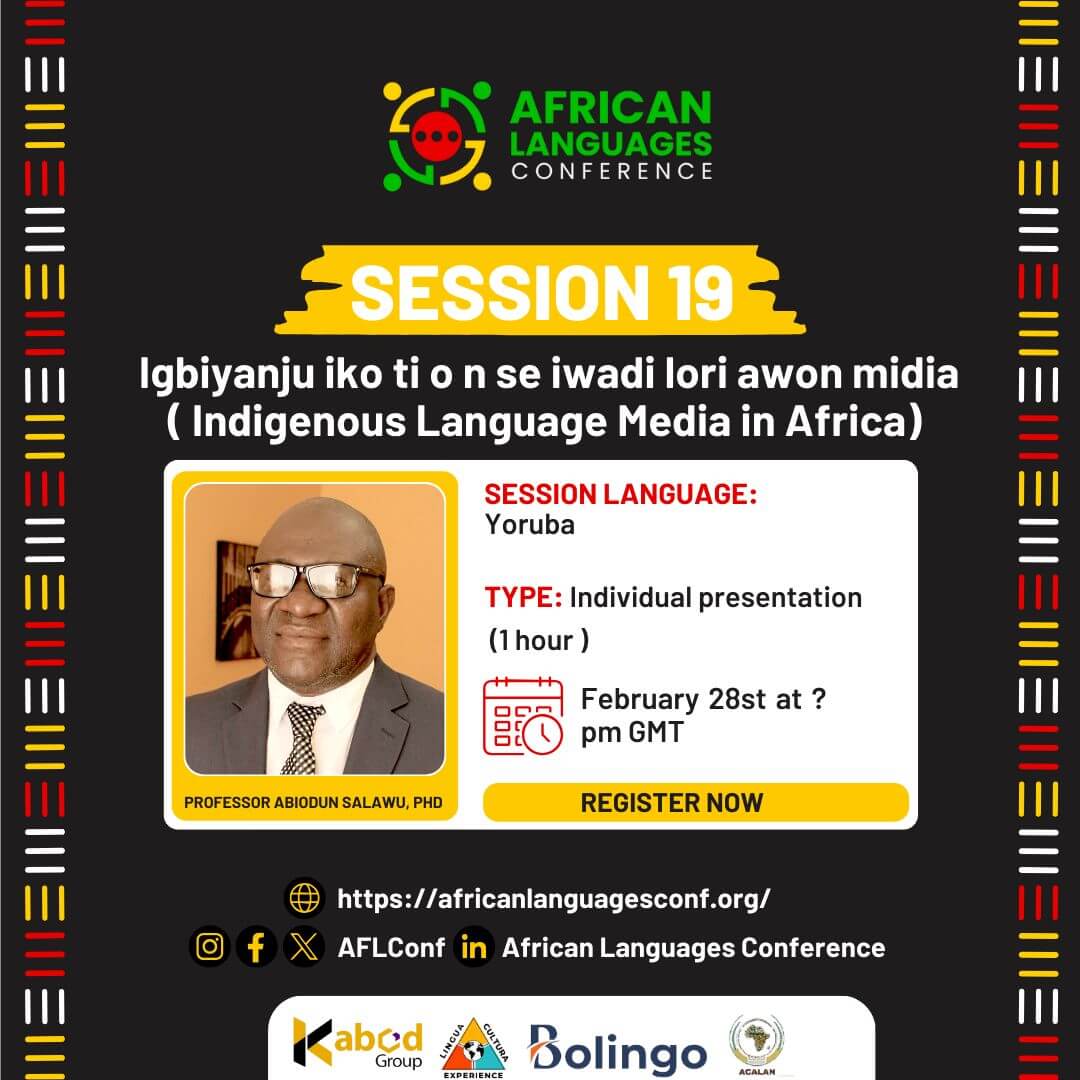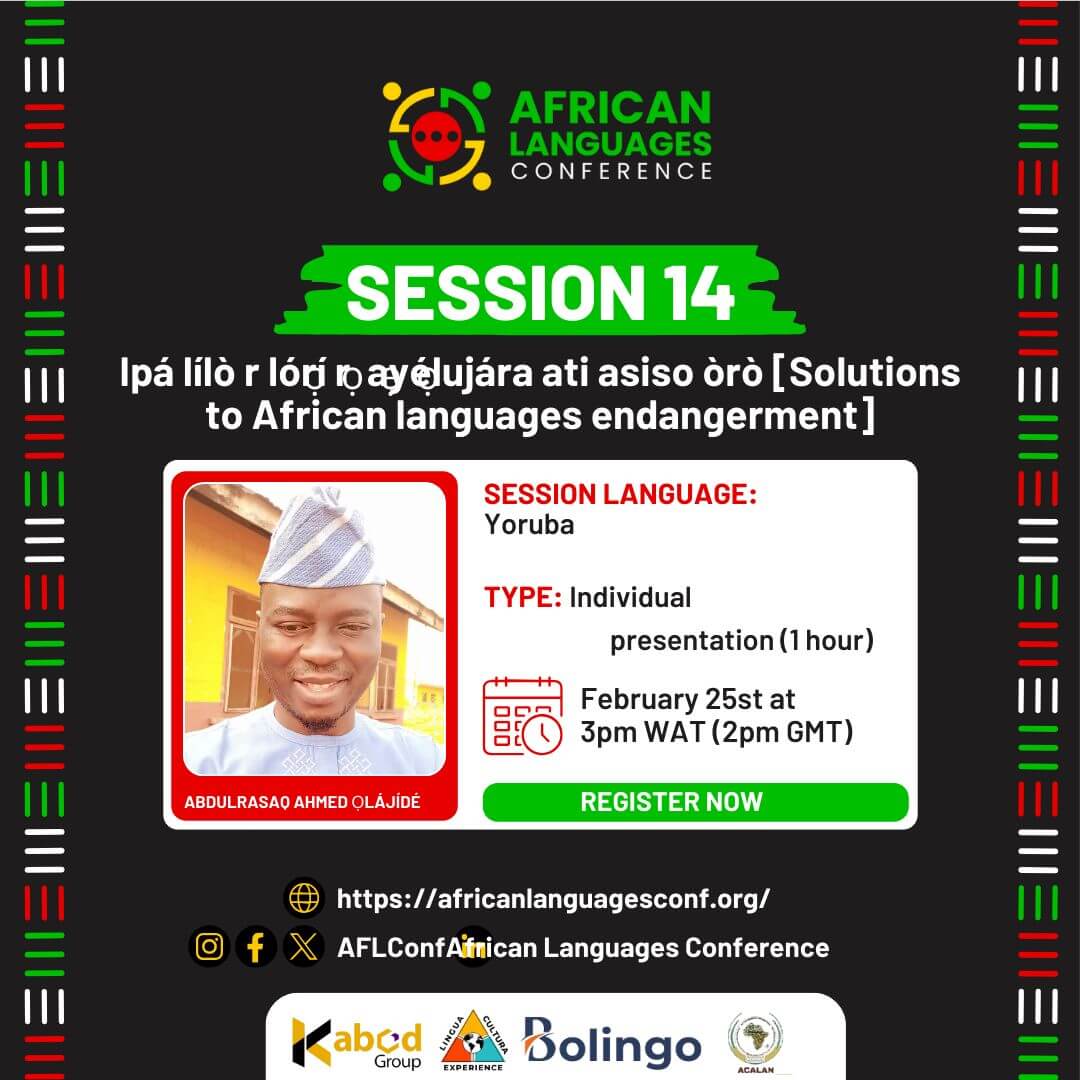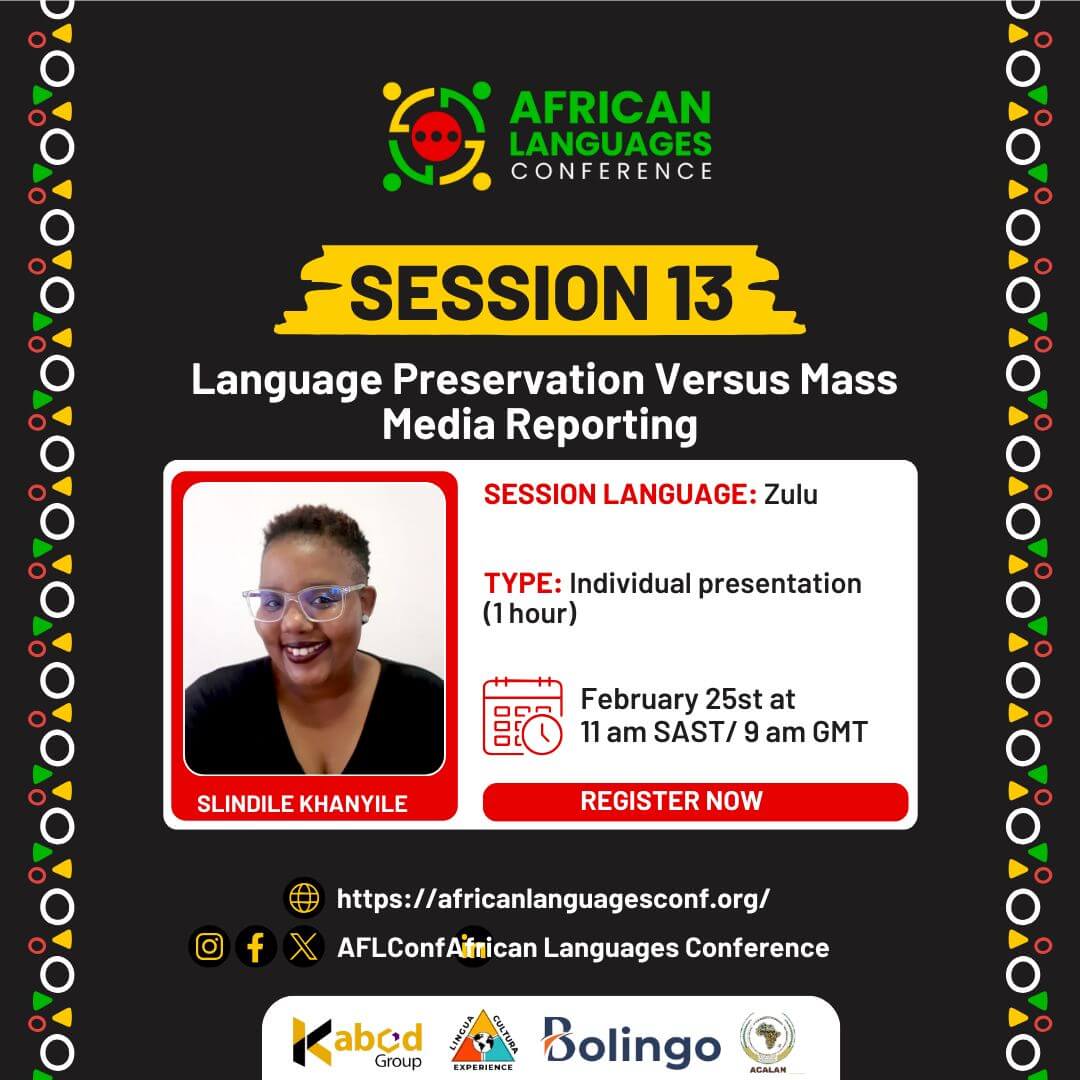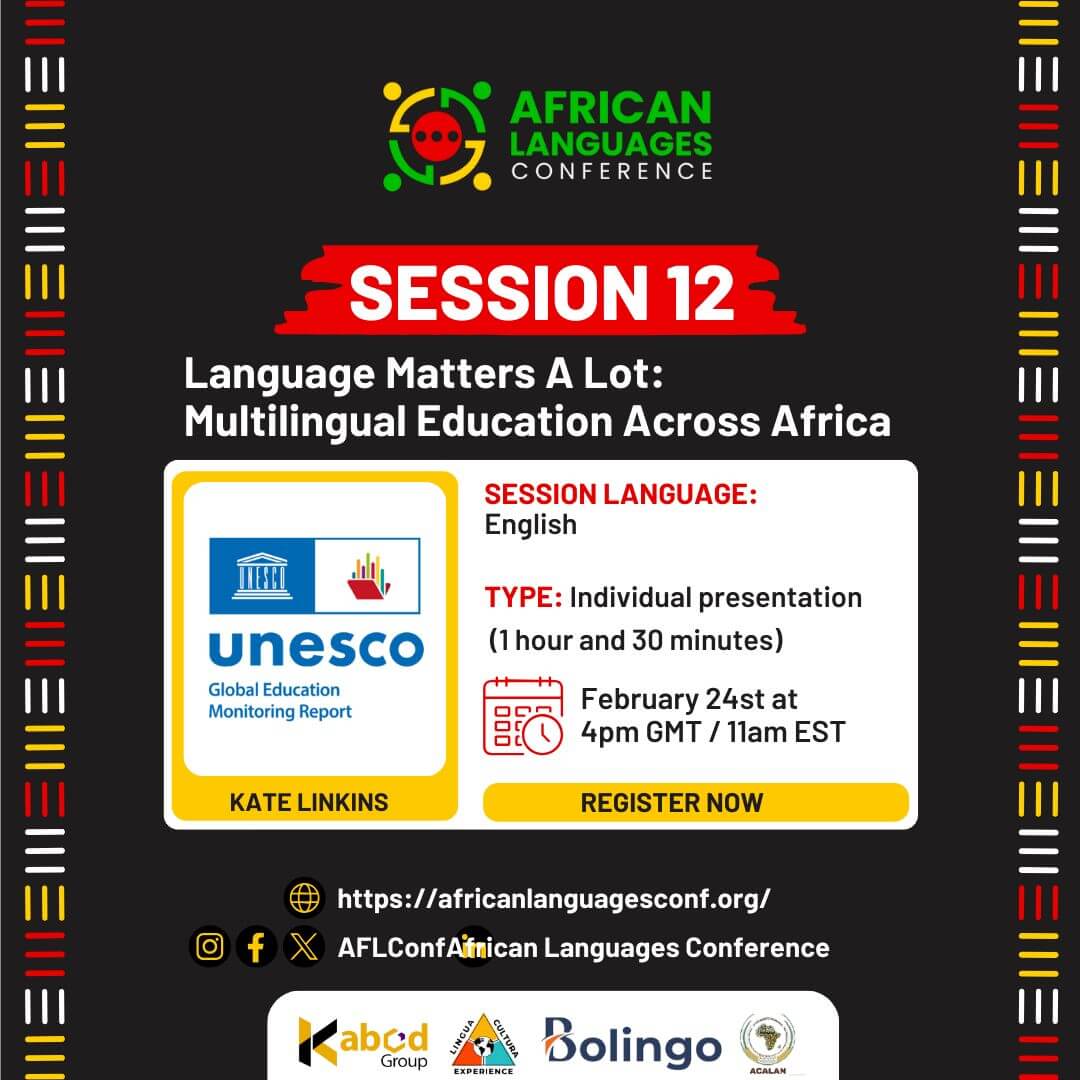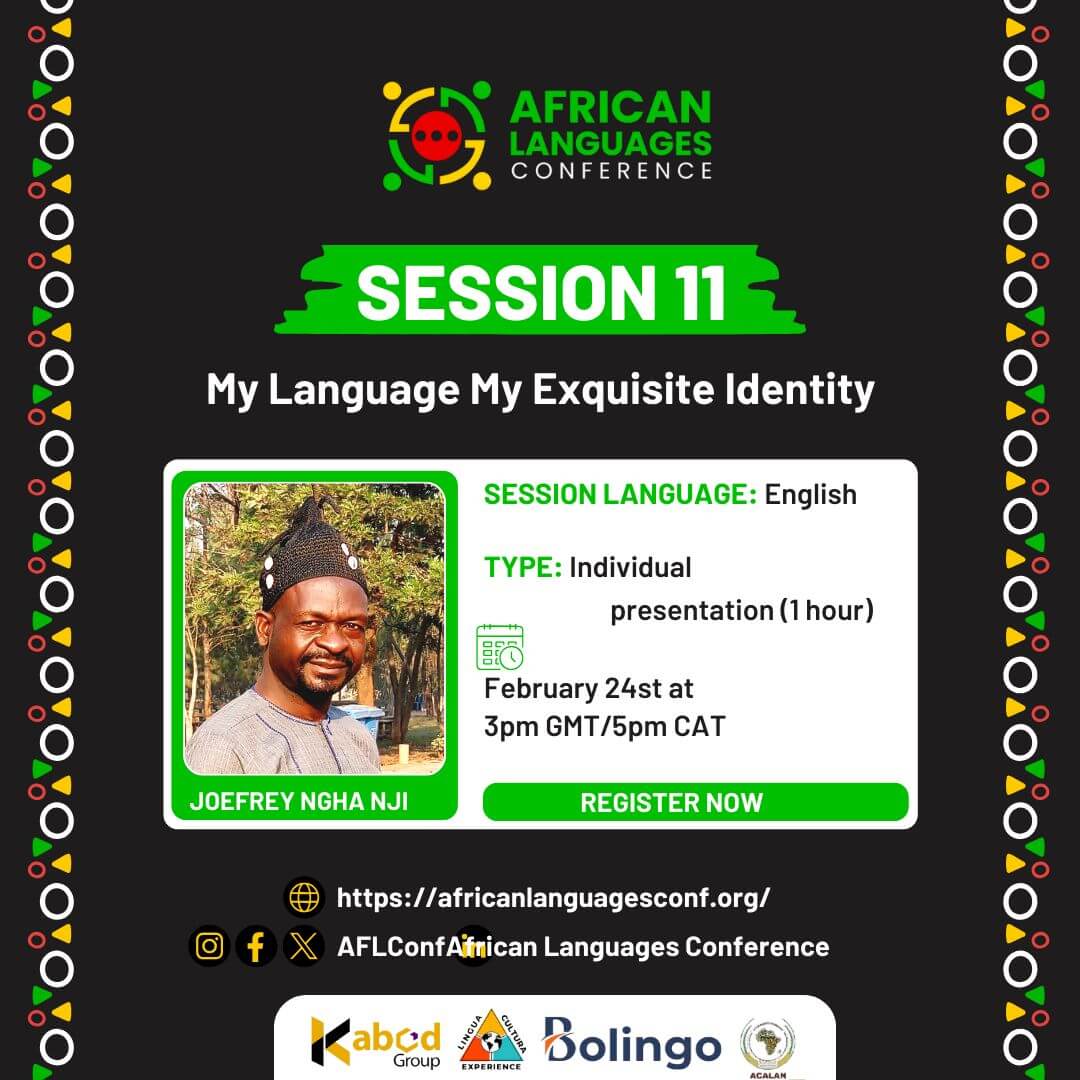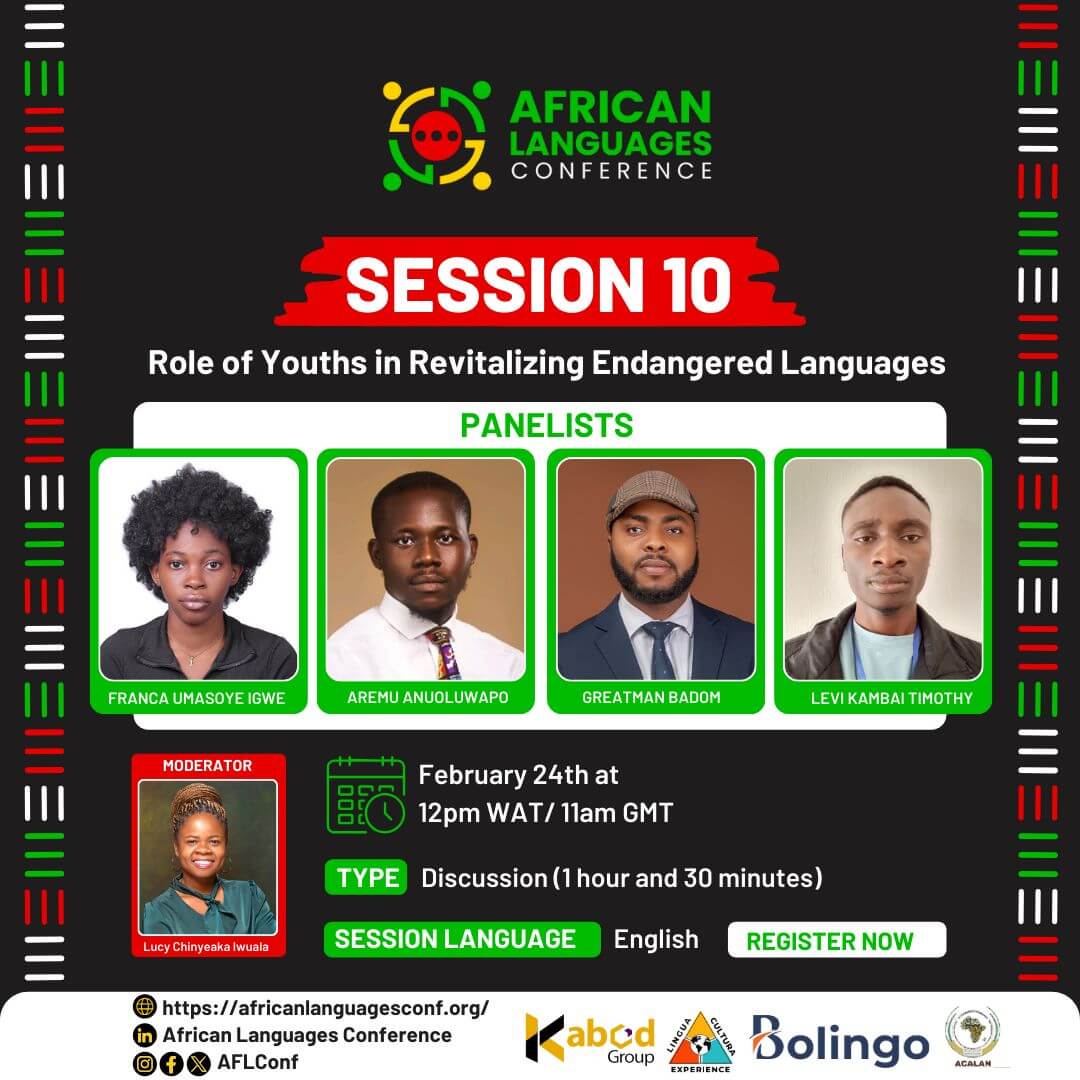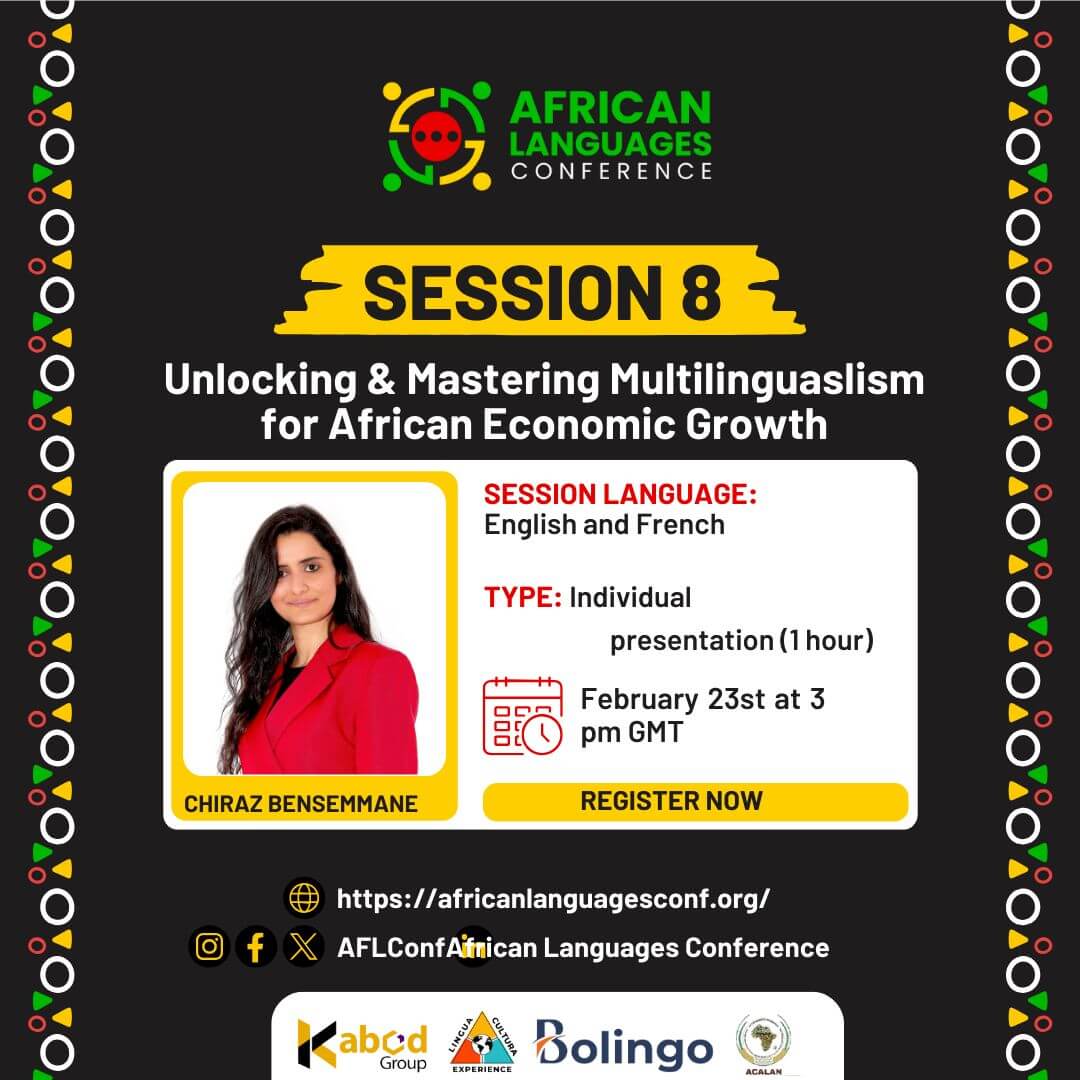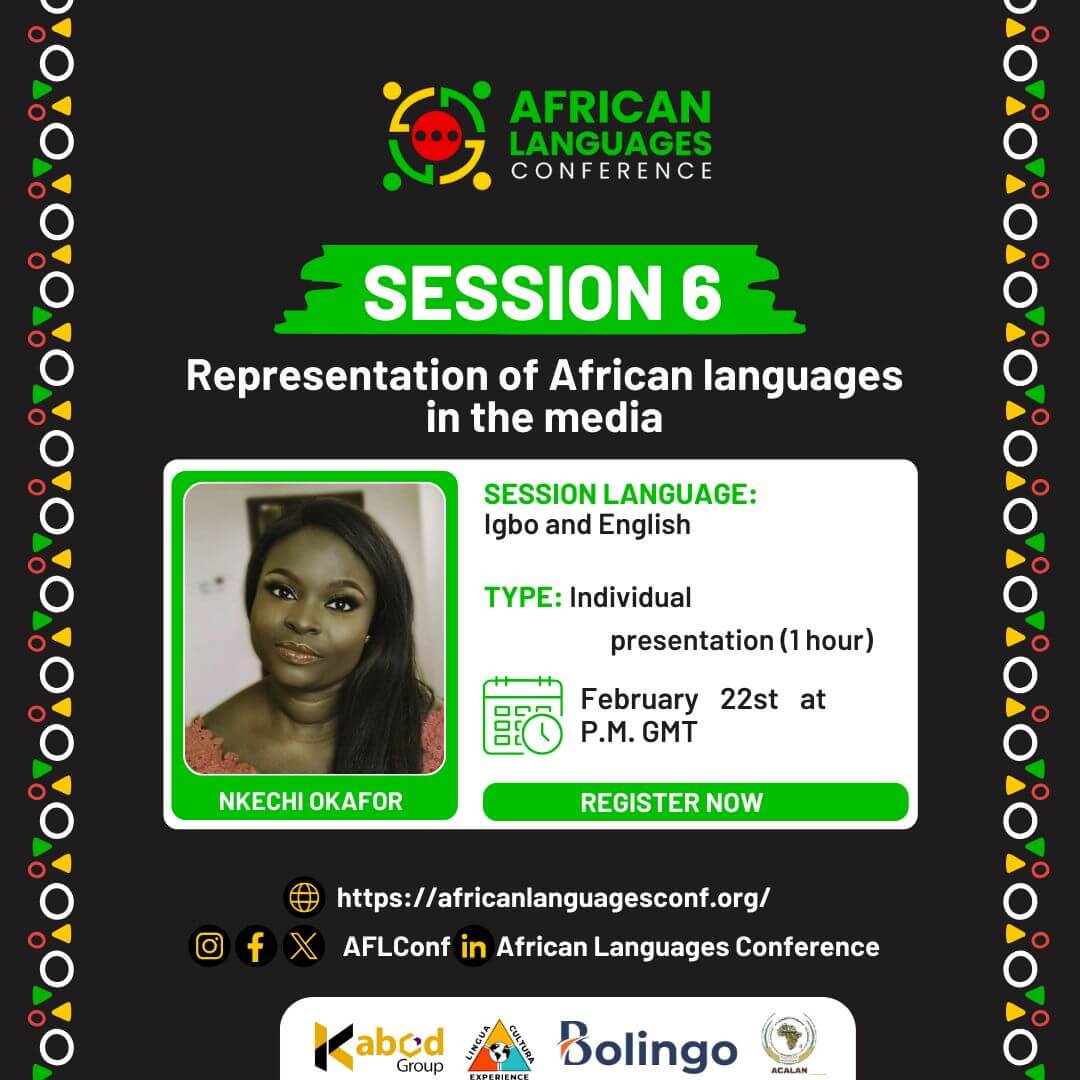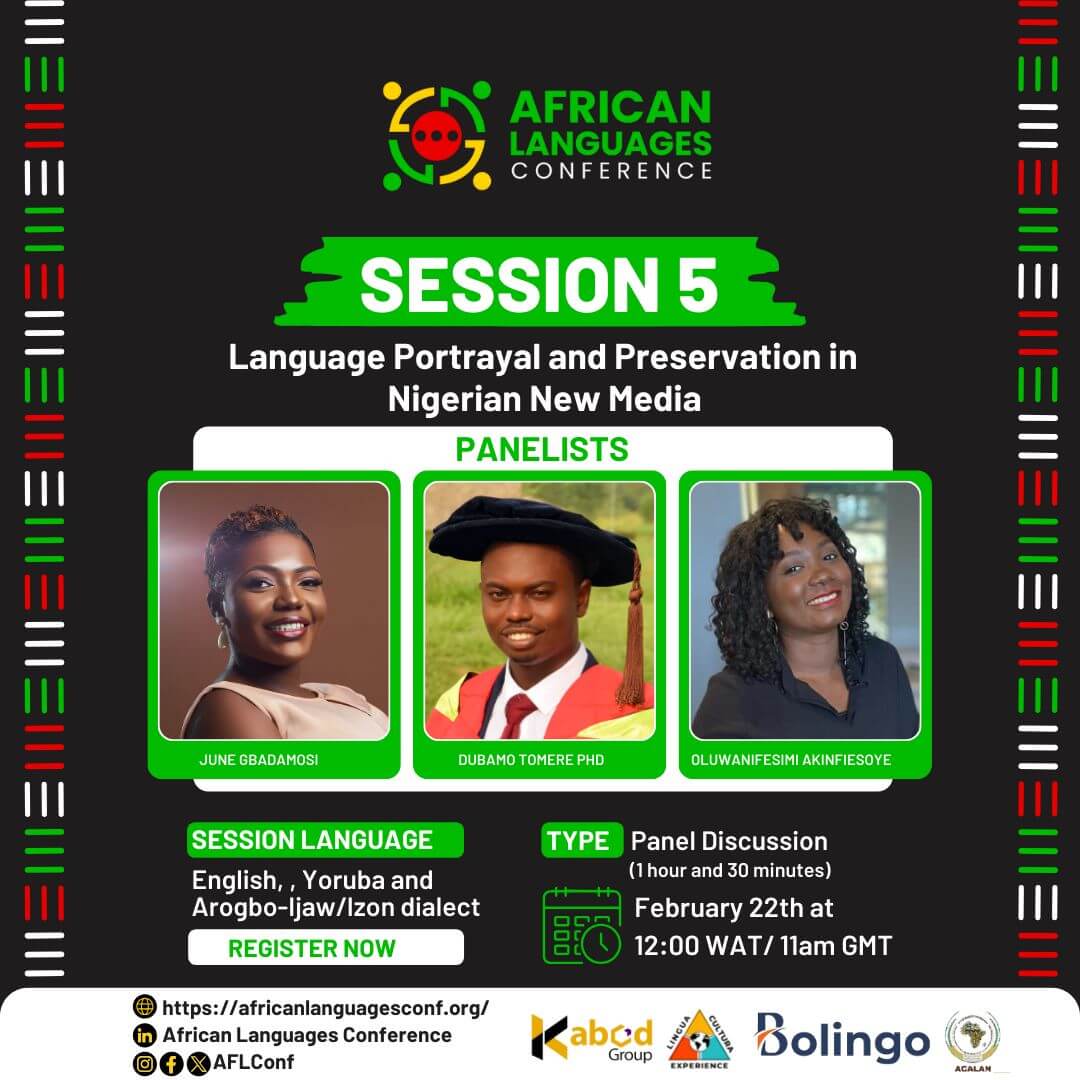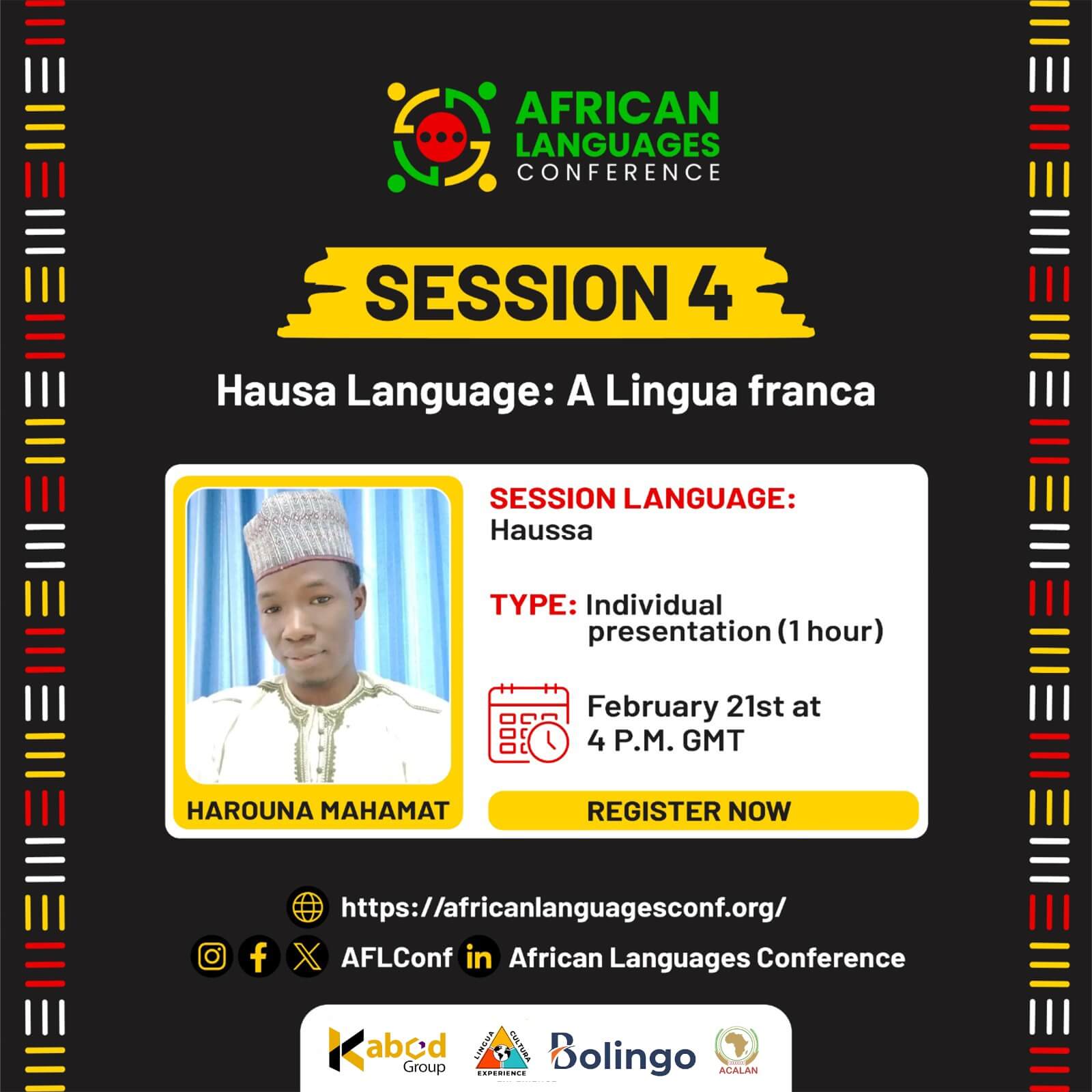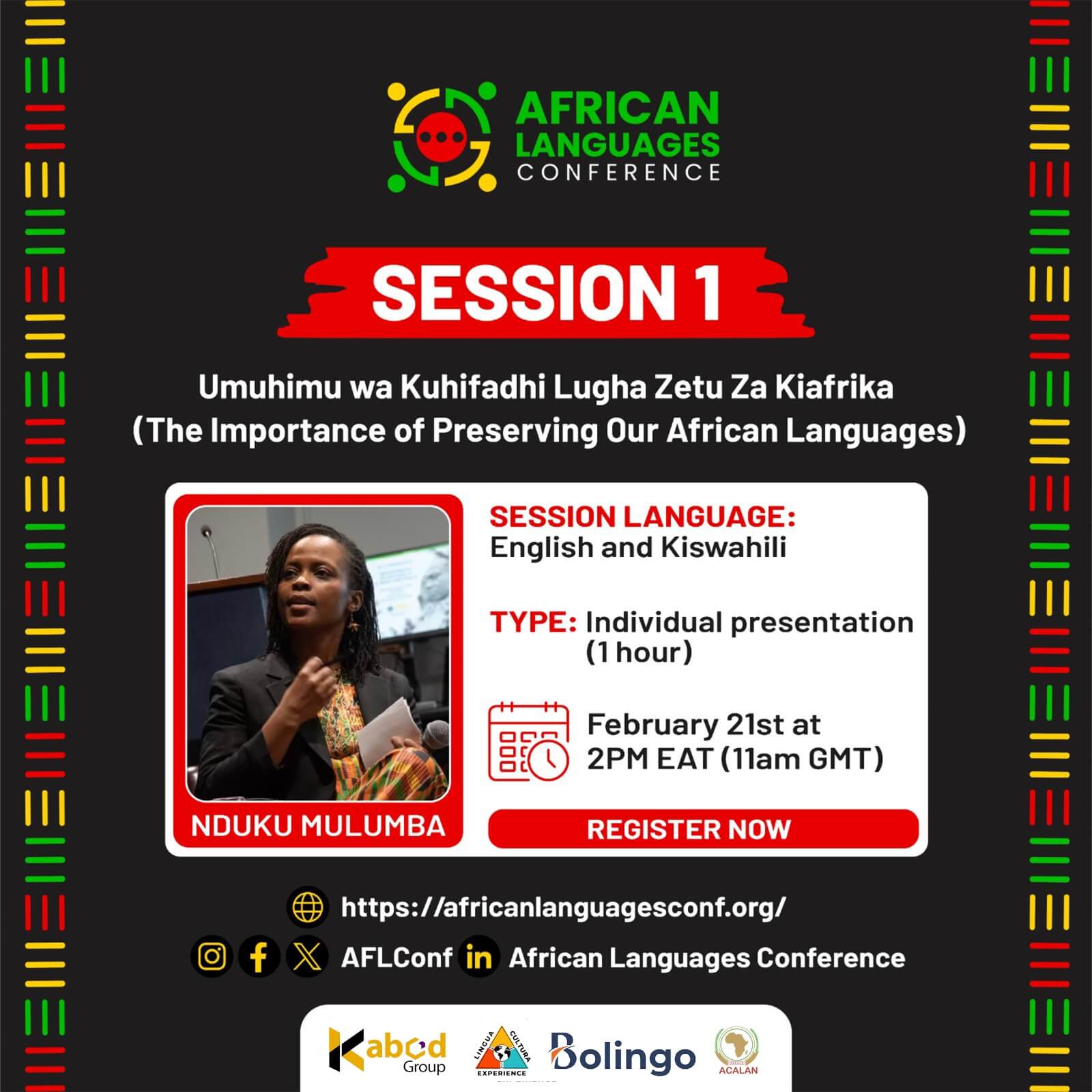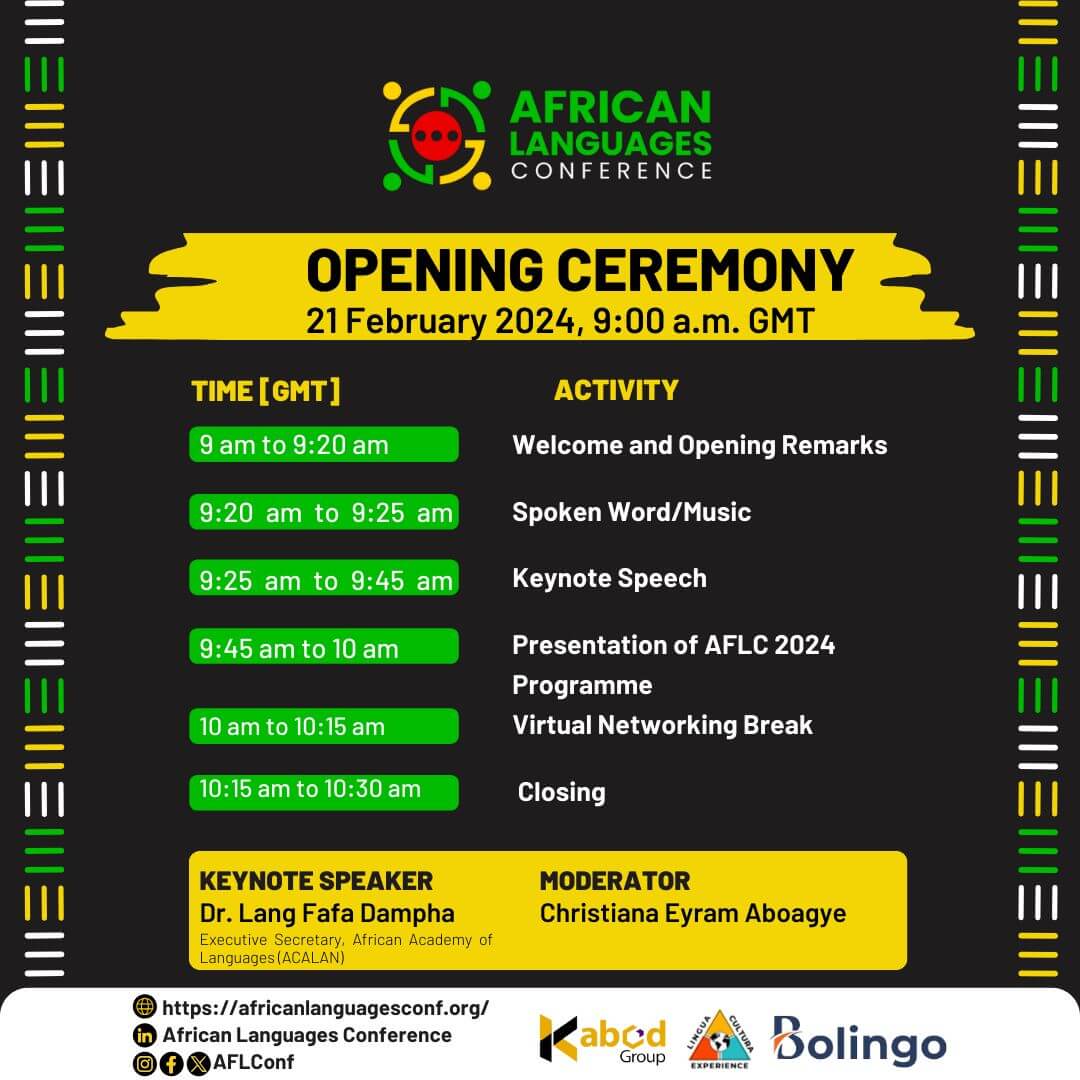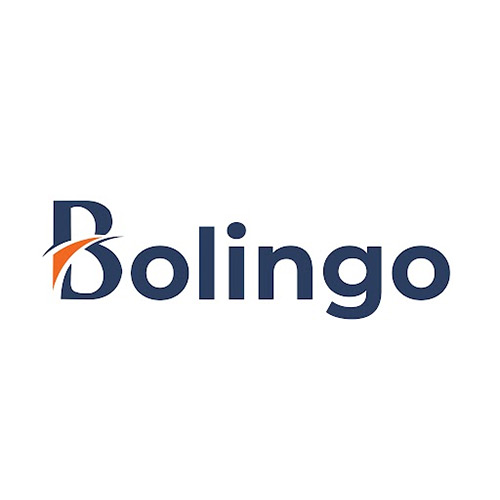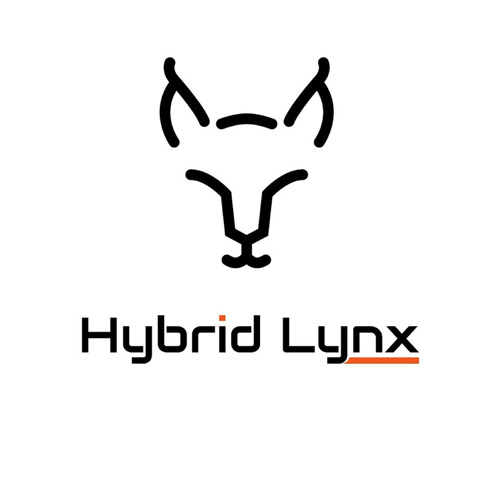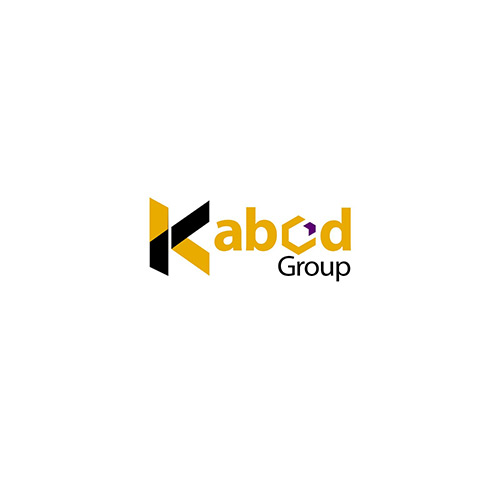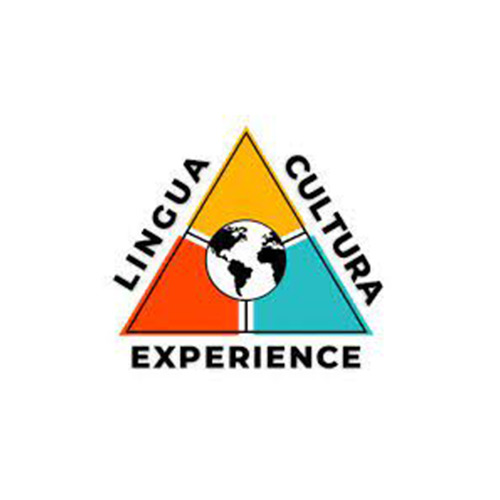AFLC 2024 PROGRAMME
AFLC 2024 Opening Ceremony
Date: 21 February, 9 am GMT to 10:30 am GMT
Keynote Speaker: Dr. Lang Fafa Dampha, Executive Secretary, African Academy of Languages (ACALAN)
Moderator: Christiana Eyram Aboagye
Opening Ceremony Agenda
Time [GMT] |
Activity |
|---|---|
|
9 a.m. to 9:20 a.m. |
Welcome and Opening Remarks |
|
9:20 a.m. to 9:25 a.m. |
Spoken Word/Music |
|
9:25 a.m. to 9:45 a.m. |
Keynote Speech |
|
9:45 a.m. to 10 a.m. |
Presentation of AFLC 2024 Programme |
|
10 a.m. to 10:15 a.m. |
Virtual Networking Break |
|
10:15 a.m. to 10:30 a.m. |
Closing |
Umuhimu wa Kuhifadhi Lugha Zetu Za Kiafrika (The Importance of Preserving Our African Languages) .
Presenter name: Nduku Mulumba
Session Language: English and Kiswahili
Type: Individual presentation (1 hour)
Description:
This session will focus on the origin of Kiswahili and why the speaker is convinced that this is a language that was created by Afrikans and not Arabs as is popularly believed. It will also touch on “linguistic colonialism”, particularly how the invasion of Afrika cost us our languages and how for example Kiswahili, which those who invaded East Afrika saw as a language that united the different peoples of Afrika, was corrupted so that it would lose its connection to us and that ability to unite us. The presentation will propose solutions for the preservation, the rebuilding, the recording, and the expansion of Kiswahili and all Afrikan languages to ensure we do not lose our Afrikan culture.
Time slot: February 21st at 2PM EAT (11am GMT)
Register in advance for this webinar:
https://us06web.zoom.us/webinar/register/WN_4TQwh9IpQ6qbmm4e3KoQFA
Please translate this into five Namibia languages!
Presenter: Timothy Barton
Session Language: English
Type: Individual presentation (1 hour)
Description:
Many of the translation requests Timothy Barton has received since moving from Europe to Namibia have been for a single text to be translated into several languages – sometimes languages with only a few thousand speakers. How does he find suitable translators when there are so few speakers, and how can he be sure they are reliable? How can he evaluate the quality if he can’t read the language? How can he help translators who have no translation training? Timothy Barton will answer these questions and suggest best practices for Project Managers working with indigenous African languages.
Speaker Bio:
Timothy Barton is a freelance translator and editor based in Oranjemund, Namibia. He specializes in macroeconomics, trade and development, working mainly for international institutions such as the United Nations, the Organisation for Economic Cooperation and Development and the World Trade Organization. He translates from French, Spanish, Catalan and Portuguese to English. He also manages many translation projects for Namibian clients, often hiring local translators working into local languages, such as Oshiwambo and Khoekhoegowab. Timothy is a member of Mediterranean Editors and Translators (MET), the Association of Professional Translators and Interpreters of Catalonia (APTIC), the International Association of Conference Translators (AITC) and the French Society of Translators (SFT).
Time slot: 21 February at 2PM CAT/ 12 noon GMT
Register in advance for this webinar:
https://us06web.zoom.us/webinar/register/WN_XsTBQMXfQyOjm9Cu2pMMeA
Enseigner la rhétorique au lycée:le wolofal, un corpus alternatif.
Nom: Ibrahima FAYE
Cette session sera en: Wolof
Type: Présentation individuelle (1 heure)
Description:
Dans le système éducatif sénégalais, l’enseignant est invité à utiliser un corpus officiel exclusivement en français, langue de l’enseignement. Cette séance démontre la pertinence de varier sur le plan linguistique ces textes par l’utilisation d’autres composés dans une des langues majoritairement parlée au Sénégal (le wolof). Cette réflexion veut être un lieu de réflexion sur la richesse des langues africaines dont les qualités thématique et stylistique ne sont plus à prouver.
Bio: Docteur Ibrahima FAYE est titulaire d’un doctorat unique en études africaines et francophones, option : littératures orales africaines. Il enseigne depuis 2020 à l’Université Cheikh Anta Diop de Dakar où il est recruté. Il est chargé de recherche à l’Institut Fondamental d’Afrique Noire – Cheikh Anta Diop (IFAN-CAD), au département de Langues et Civilisations, Laboratoire de Littératures et Civilisations africaines.
Date: Le 21 février à 15 h GMT
Inscrivez-vous à l’avance à ce webinaire:
https://us06web.zoom.us/webinar/register/WN_5KaLF8ASSeiGshLAx8WLxQ
Hausa Language: A Lingua franca
Name: Harouna Mahamat
Session Language: Hausa
Type: Individual presentation (1 hour)
Description:
This session will shed light on Hausa and its position in African society today. Harouna will discuss how the language can be used to empower education, technology, and African integration. Additionally, he will address the challenges faced by the language and propose some potential solutions. This presentation is an opportunity to shed light on Hausa’s importance and explore ways to overcome obstacles in its development and utilization.
Speaker Bio
Harouna Mahamat, a 28-year-old Cameroonian Hausa linguist and diplomacy student, is a trailblazer in promoting African languages and cultural exchange. As the Executive Secretary General of the Hausa Cultural Centre and co-founder of the African LangService Hub, his contributions have been instrumental in elevating the status of Hausa language and fostering linguistic diversity. With his expertise in Hausa, French, English, Arabic, Chinese, and Hindi, Harouna Mahamat bridges cultural gaps and communicates effectively, while his numerous articles on Hausa language and African languages promotion showcase his commitment to preserving and celebrating African linguistic heritage.
Time Slot: [21 February, 4 P.M. GMT]
Register in advance for this webinar:
https://us06web.zoom.us/webinar/register/WN_IyFD1coATluOIKVmBdh3pQ
Session 5: Language Portrayal and Preservation in Nigerian New Media.
Session Languages: English, Yoruba and Arogbo-Ijaw/Izon dialect
Type: Panel Discussion (1 hour and 30 minutes)
Description:
The primary goal of this session is to examine and uncover the elements that contribute to the diminishing practice and instruction of Nigerian indigenous languages among individuals in Nigeria and the diaspora. Panelists will delve into the impact of migration and foreign cultures, the role of re-education, and strategies for preserving our indigenous languages across successive generations.
Panelists:
- June Gbadamosi
- Dubamo Tomere PhD
- Oluwanifesimi Akinfiesoye
Time slot: 22 February 22, 12:00 WAT / 11 A.M. GMT
Register in advance for this webinar:
https://us06web.zoom.us/webinar/register/WN_w-nLJ0cGQXKbxZjhHT-D1A
Representation of African languages in the media
Presenter: Nkechi Okafor
Session Language: Igbo and English
Type: Individual Presentation (1 hour)
Description:
In this dynamic presentation, we delve into the challenges and opportunities surrounding the representation of African languages in media. From traditional outlets to the digital sphere, we explore strategies for amplifying linguistic diversity. Uncover successful case studies, examine the role of media literacy, and discuss the pivotal intersection of technology and language empowerment. Be part of the conversation as we present recommendations and envision a future where African languages not only survive but thrive in the global media landscape. Don’t miss this insightful session that aims to inspire collaboration and ignite change for linguists.
Speaker Bio: Okafor Nkechi Abundance is a passionate advocate for linguistic diversity, with a focus on African languages. She is an Interpreter and Translator for English < > Igbo.
Time slot: February 22 at 3 P.M GMT
Register in advance for this webinar:
https://us06web.zoom.us/webinar/register/WN_fejdxa1MT7Glh8L8b9ickw
Exploring Indigenous Language Systems for Sustaining Moral Values
Name: Adekunle Adediran
Session Language: English
Type:Individual presentation (1 hour)
Description:
This session explores the role of indigenous language systems for sustaining moral values towards effective upbringing of children in Nigeria. Indigenous languages in Nigeria represent a rich cultural heritage and serve as repositories of traditional wisdom, ethical codes, and moral values. The findings of the speaker revealed that Indigenous languages serve as cultural reservoirs, embodying the collective wisdom, ethical codes, and traditional knowledge of their respective communities. The cultural embeddedness of moral values within indigenous languages is evident through linguistic expressions, oral traditions, and the cultural context in which these languages are spoken.
Time slot: February 23 at 1pm GMT
Register in advance for this webinar:
https://us06web.zoom.us/webinar/register/WN_mlkUgQbiTd268JiFNV-4xw
- Unlocking & Mastering Multilingualism for African Economic Growth
Name: Chiraz Bensemmane
Session Language: English and French
Type: Individual presentation (1 hour)
Description:
Explore the transforming impact of adopting multilingualism as a dynamic accelerator for African economic success. The importance of language in labour market dynamics, entrepreneurship, and the blending of local and global languages—English, French, Spanish, and Arabic—is the subject of our discussion. We promote multilingualism in order to facilitate seamless communication, trade, and collaboration, which is consistent with the aims of the African Continental Free Trade Agreement (AfCFTA). Imagining a future in which linguistic diversity serves as a uniting factor, boosting socioeconomic success and laying the framework for Africa’s vigorous global involvement.
Speaker Bio: Serial entrepreneur, moderator and speaker, and Algeria Laureate for Women in Africa WIA54 2021 program, Chiraz Bensemmane helps companies, individuals, and public authorities get access to the right resources so they can grow and have a greater impact.
Time slot: [23 February at 3pm GMT]
Register in advance for this webinar:
https://us06web.zoom.us/webinar/register/WN_wg4u75sUT7qYACjFpg82qw
Retelling Hamlet in Nigerian Pidgin English
Presenter: Bernard Ogini
Session Language: Nigerian Pidgin English
Type: Individual presentation (1 hour)
Session Description:
This session will deconstruct the language used in Shakespeare’s hamlet into the Nigerian Pidgin without losing its subject matter and the theme. It aims at retelling Shakespeare’s Hamlet in the African style. The session aims to decolonize the westernized narratives that has dominated literature for centuries ; it seeks to make Shakespeare’s works more accessible to the layperson ; promote Nigerian Pidgin on an international scale and will also serve as a call to activate Pidgin Literature and Literature in Pidgin English.
Speaker Bio:
Ogini Bernard is a Nigerian pidgin playwright, translator, researcher and a visual artist. Bernard has exhibited his exceptional skills and dedication to the world of theatre, visual art, Language translation and language technology.
Time slot: February 24, 10am GMT
Role of Youths in Revitalizing Endangered Language
Session Language: English
Type: Panel Discussion (1 hour and 30 minutes)
Description:
This session aims to discuss and proffer ideas through which endangered languages could be reawakened/revived for the protection of our linguistic diversity and preservative strategies.
It focuses on community involvement with emphasis on the important role of native speakers in reviving languages. This will empower communities to take charge of preserving their language heritage.
Encouraging the inclusion of language programs in schools will ensure that these languages get taught and passed on to future generations.
Furthermore, it will take into consideration the exploration of technology by the youth and the pivotal role of governmental support and important policies.
Moderator: Lucy Chinyeaka Iwuala
Panelists:
- Franca Umasoye Igwe:
- Aremu Anuoluwapo
- Greatman Badom
- Levi Kambai Timothy (Kambai Akau)
Time slot: February 24th at 12pm WAT/11AM GMT TO 12:30PM GMT
Register in advance for this webinar:
https://us06web.zoom.us/webinar/register/WN_V1tptawFR4y9p-Dz8vfIdQ
My Language My Exquisite Identity
Name: Joefrey Ngha Nji
Session Language: English
Type: Individual presentation (1 hour)
Description:
This session sheds light on the need to valorise our indigenous languages, because our languages are our identities, once you miss out on valorising your language you are alienated from your ROOTS, this is because when you learn the language of another you are learning their culture as well. Therefore it should be our prerogative as Africans to look for ways and means to standardize our languages, even teaching the English Language one should never shy away from explaining things in the mother tongue whenever the need arises.
Speaker Bio:
Joefrey Ngha Nji has a PhD in Applied Linguistics, specialised in Discourse Analysis. He is currently a Senior Lecturer at HTTC Maroua in the University of Maroua and has published academic articles in both national and international journals. His areas of research interests include Linguistics, Language Use, Bilingualism, Language Teaching. He has also published a collection of poems entitled: **Africa Must Be Liberated**. Civil rights activist after the Order of Martin Luther King Jr.
Time slot: [24 February at 3PM GMT/5PM CAT]
Register in advance for this webinar:
https://us06web.zoom.us/webinar/register/WN_OpuXkPKJReKcavmTe98AUA
Language Matters A Lot: Multilingual Education Across Africa
Session Language: English
Type: Panel Discussion (1 hour and 30 minutes)
Description:
African children are overwhelmingly taught in a language they do not speak at home. At most 1 in 5 students are taught in their home language. Evidence from the recent Spotlight report on foundational learning in Africa demonstrates that even partial use of home language is associated with a higher probability of learners being literate after a full primary school cycle. The presentation provides an overview of the language of instruction policies in Africa and examines the extent to which the continent is addressing its linguistic diversity with reference to case studies shared by policy makers from Mozambique and Côte d’Ivoire.
Panelists:
- Josephine Kiyenje, Spotlight Lead, Global Education Monitoring Report, UNESCO (moderator)
- Dr. Carlos Manuel, Eduardo Mondlane University
- Ingrid Sapire, University of the Witwatersrand, Humanities Department, Department Member. Studies Humanities, Philosophy, and Psychology
- Barbara Trudell, Senior Literacy and Education Consultant, SIL International
- Dr Hellen N Inyega, Professor of Language and Literacy Education,Dept. of Educational Communication Technology and Pedagogical Studies, University of Nairobi, Kenya
Time slot: 24 February at 4PM GMT/11AM EST
Register in advance for this webinar:
https://us06web.zoom.us/webinar/register/WN_FUbIdgSOQLW6T0FhBF8Rtg
Language Preservation Versus Mass Media Reporting
Name: Slindile Khanyile
Session Language: Zulu
Type:Individual presentation (1 hour)
Description:
The objective of this session will be to look at the challenges faced by news media organisations who try to strike a balance between language preservation and storytelling for mass media consumption. How far does one go in adopting the modern use of the language without bastardising the language?
Speaker Bio:
Slindile Khanyile is a versatile journalist and editor with more than 20 years of mainstream media experience. In September 2020 she co-founded an isiZulu online business publication, Umbele, the first of its kind in South Africa. Earlier that year she had also launched Umkhanyisi, a Zulu-medium digital education publication. Slindile is the former editor of Isolezwe, the largest Zulu newspaper in South Africa.
Time slot: February 25 at 11 AM SAST/9am GMT
Register in advance for this webinar:
https://us06web.zoom.us/webinar/register/WN_qRaLYRjfSs2Tayhw_rOIAA
Ipá lílò ọrọ lórí ẹrọ ayélujára ati asiso òrò [Solutions to African languages endangerment]
Name: Abdulrasaq Ahmed Ọlájídé
Session language: Yoruba
Type: Individual Presentation
Session Description in Yoruba:
Àwọn ohun tí mo fẹ́ ṣàlàyé tàbí ṣiṣẹ́ lé lórí ni wọ̀nyí :
(1) kín ni èdè?
(2) kín ni ìjọba àti ojúṣe wọn fún ìdàgbàsókè ará ìlú àti ìlú?
(3) Ṣé ìṣòro ni kí elédè púpọ̀ wà ní àwùjọ /orílè-èdè kan ?
(4) Ń jẹ́ èdè ni ojúṣe tàbí ipa kan sí òmíràn láti kó nínú àṣeyọrí Ètò èkó ní ilẹ̀ adúláwò àti ní àgbáyé? (5) àwọn wo lóye kí ó gbé èdè lárugẹ?
Session Description in English:
This session will raise and discuss the following questions:
(1) What is language ?
(2) What is the role of the government in language revitalization ?
(3) Is multilingualism a problem in a society ?
(4) Do languages have any significant impact on quality education in Africa and the world ?
(5) Who should be participating in language activism ?
Speaker Bio:
Mallam Abdulrasaq Ahmed Olajide is a native of ilorin kwara State Nigeria. He started his educational Career in ilorin kwara State in Samsudeen LGEA primary school. He is currently pursuing an MA student in YORUBA Literature at the University of ilorin, ilorin Nigeria.
Time slot: February 25, 2024 at 3pm WAT (2pm GMT)
Register in advance for this webinar:
https://us06web.zoom.us/webinar/register/WN_aEWsEtOQRyqymVkTJ_PrSA
Akan kasa ahodoɔ adida wɔ dawubɔ dwumadie mu (Representation of Akan Languages in The Ghanaian Media).
Session Language: Twi and Fante
Type:Panel Discussion (1 hour and 30 minutes)
Description:
The session will explore the use of the Akan language in the media and specifically share learnings and experiences from the Akannews.com project. The panel is composed of three Akan language content creators and linguists.
Moderator: Emmanuel Clifford Gyetuah
Panelists
- Joseph Aboagye
- Ebenezer Offen
- Konamah Tawiah
- Belinda M. Tuffour
Time slot: February 26 at 2:00 PM GMT
Register in advance for this webinar:
https://us06web.zoom.us/webinar/register/WN_LFaniawIRhaFzLeHX3faLw
An Analysis of Gen-Z Pidgin Slangy Expressions among Students
Session Language: English and Nigerian Pidgin English
Type: Panel Discussion (1 hour and 30 minutes)
Description:
Gen-Z is a new age generation of teenagers and youths who are exposed to new technologies and social media. They comprise majorly of students and people in tech. Their use of pidgin, which is a contact language, is extremely unique especially with slangy expressions. This session aims at describing Nigerian pidgin slangs used by Gen-Z students of the University of Port Harcourt employing the Referential theory of Ogden and Richard (1923) for analysis. Its key objectives are: to examine literal and non-literal interpretations of Gen-Z slangs; Identify the linguistic feature in the slangs; and determine slangs whose literal meaning correspond with their referents.
Moderator: Evans Jaja
Time slots: Feb 26 at 5PM WAT /4pm GMT
Register in advance for this webinar:
https://us06web.zoom.us/webinar/register/WN_l24VXHK4TT6N-tXY-OT9YA
Exploring Linguistic Diversity in Africa
Session Language: Swahili and English
Type: Panel Discussion (1 hour and 30 minutes)
Description:
This session delves into Africa’s linguistic diversity, surveying languages and their classification. We’ll explore language families, emphasizing distinctive traits. Shifting gears to translation challenges, we’ll spotlight issues rooted in cultural nuances and linguistic structures. Examining translation’s pivotal role in information access, we’ll discuss how it can bridge linguistic divides. The impact of translation technologies on African languages will be analyzed, showcasing their potential to enhance inclusivity.
Panel Member 1: Faith Wangui Ndungu
Bio: With a passion for languages, Faith Wangui is a seasoned interpreter, specializing in Swahili and Kikuyu. Leveraging her linguistic expertise, she contributes to effective cross-cultural communication. Committed to promoting understanding, her work reflects a dedication to breaking down language barriers in diverse settings.
Panel Member 2: Mary Wangui Mwangi
Bio: Mary Mwangi is a teacher by profession and a certified Swahili interpreter based in Kenya. She has taught Swahili language in schools for more than 5 years and examined students nationally for more than 4 years. Driven by her great passion for languages, she decided to explore interpretation and translation. She takes delight in being able to identify and explain nuances in different languages thus facilitating communication and building relationships.
Time slot: 27 FEB at 10AM GMT
Register in advance for this webinar:
https://us06web.zoom.us/webinar/register/WN_QonwWyoUT8ugZJmnGrIGAQ
Language Representations of Cultural Identity in Popular Media
Session Language: Kiswahili, Sheng’, English
Type: Panel Discussion (1 hour and 30 minutes)
Description:
In the era of cultural renaissance, popular media (films, podcasts, social media) and their personnel (producers, actors) are adopting local languages in contributing to representations of cultural identities to international audiences. Versions of cultural representations in the international public in these media are influenced by the media’s own economic agenda, language skills, geopolitics, imperialist interests, cosmology of owners and funders. Popular media influences their audiences to believe in their versions of cultural representations, it is important to engage with ways that language in popular media ensures accurate representation of cultural identities to global audiences.
Moderator: Omusula Omuholo
Panelists:
- Mokaya Bosire
- Jack Ochieng’ Ohito
- Christy Nana Yaa Agyare
- Daniel Appiah Gyekye
- Kennedy M. Bosire
Time slots: February 27 at 10AM EST/3pm GMT
Register in advance for this webinar:
https://us06web.zoom.us/webinar/register/WN_LP-QDKpVQOiuxwSrCGa05Q
Igbiyanju iko ti o n se iwadi lori awon midia ( Indigenous Language Media in Africa)
Name: Professor Abiodun Salawu, PhD
Session Language: Yoruba
Type: Individual presentation (1 hour)
This session sheds light on a research paper that examines the essence of the research entity, Indigenous Language Media in Africa (ILMA) as well as its activities in developing and promoting research in African Indigenous Language Media and Journalism. ILMA is a research niche area of the North-West University, South Africa. It focuses on issues of African languages in the media, the contrast between public and private financing of the media, the media and identity, the media and politics, the internet, media and democracy, media and development as well as African traditional communication/media systems and their applications. The goal of the research entity is to research the indigenous language media and the traditional communication systems in Africa in terms of their nature, content, styles, organisational management as well as their applications for democracy, development and corporate communication.
Profile/Bio
Abiodun Salawu is Professor of Journalism, Communication and Media Studies and Director of the research entity, Indigenous Language Media in Africa (ILMA) at the North-West University, South Africa. He has taught and researched journalism, media and communication for close to three decades in Nigeria and South Africa. Prior to his academic career, he practised journalism in a number of print media organisations in Nigeria. He has to his credit, well over a gross of scholarly publications in academic journals and books. He has also edited/co-edited eleven books and authored one. He is a regular presenter of papers at local and international conferences. He is a co-vice chair of the journalism section of International Association for Media and Communication Research (IAMCR) and a member of editorial/advisory boards of a number of journals. He was involved in the founding of the International Association for Minority Language Media Research. He is rated by the NRF as an established researcher at the level of C1 (with international recognition) and he is a member of the Codesria’s College of Senior Academic Mentors. He is also a Distinguished Professor in the School of Liberal Arts and Humanities, Woxsen University, Hyderabad, India.
Time: February 28, 4pm WAT / 3pm GMT
Register in advance for this webinar:
https://us06web.zoom.us/webinar/register/WN_O_BBpXpbRJ-XwSu6-LOkPw
Ìṣòro tó ń pagidínà èdè Yorùbá àti ọ̀nà àbáyọ (Factors contributing to language endangerment and solutions)
Speaker: Mayowa Samuel
Session Language: Yorùbá
Session Description in Yorùbá:
Gẹ́gẹ́ bí a ti mọ̀, èdè jẹ́ ọ̀nà ìbára ẹni sọ̀rọ̀. Èdè yìí kan náà jẹ́ ọ̀nà ìdánimọ̀ tí ó ya àwùjọ kan sọ́tọ̀ gédégédé. Ìṣòro èdè Yorùbá : ìjọba, àwùjọ kò gbárùkù tí kíkọ́ èdè Yorùbá. Ọ̀nà Àbáyọ : ṣíṣe kóríyá fún àwọn akẹ́kọ̀ọ́ èdè Yorùbá láti ọ̀dọ̀ ìjọba àti àwùjọ.
Session Description in English:
Language is a medium of communication. It is also a marker of cultural and ethnic identity. This session will discuss the challenges faced by Yorùbá such as lack of governmental and societal support for language learning. The session will proffer strategies to address these challenges.
Speaker Bio:
Samuel Mayowa graduated from the Federal College of Education Okene in 2011 where he studied Yorùbá/English. In 2014, he was admitted to Adekunle Ajasin University, Akungba Akoko, where he studied Arts Education, majoring in Yorùbá Language. Presently, he is a Master’s Degree student at University of Ilorin, studying Yoruba language.
Time Slot: February 28 at 2:00 P.M. GMT.
Register in advance for this webinar:
https://us06web.zoom.us/webinar/register/WN_665PIC6CTiS2tFYsTZRZAw
African Languages Conference 2024
About AFLC 2024
The African Languages Conference (AFLC), a flagship event in linguistic and cultural preservation, is set to return in 2024. AFLC is organised by Ady Namaran Coulibaly (Bolingo Consult), Avishta Seeras (The Lingua-Cultura Experience/Cultura Connector), Christian Elongué (Kabod Group) and with the partnership of the African Academy of Languages (ACALAN). The conference serves as a pivotal platform for language activists, scholars, linguists, educators, and enthusiasts to converge, exchange ideas, and foster collaborations aimed at promoting the rich tapestry of African languages. The 2024 edition of the conference is on the theme “African Languages: Challenges and Opportunities”.
This year’s conference has 19 sessions, most of which will be held in African indigenous languages. The sessions will be in Wolof, Zulu, Twi, Yoruba, Kiswahili, Sheng’, Igbo, Nigerian Pidgin English, French and English.
